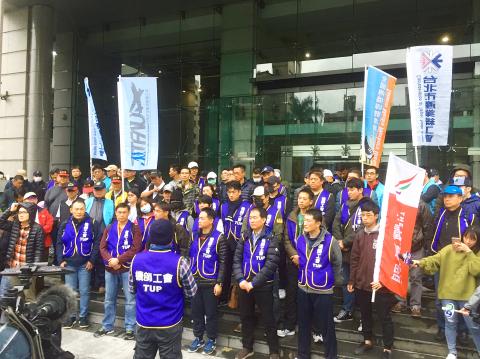China Airlines Ltd (CAL, 中華航空) yesterday was criticized by the Taoyuan Union of Pilots for undermining flight safety to maintain its proclaimed 90 percent flight capacity, as the strike by CAL pilots continued for a second day.
A mediation meeting at the Ministry of Transportation and Communications (MOTC) in Taipei, attended by representatives from the union, CAL, the MOTC, the Ministry of Labor, the Civil Aeronautics Administration and the Taoyuan Department of Labor began at 3pm.
The discussions were sluggish from the start, and participants had not even addressed the union’s first demand of aleviating “fatigue flights” — or flights of more than 12 hours — almost two hours into the meeting.

Photo: Chen Yi-chia, Taipei Times
Negotiations were continuing as of press time last night.
According to union chairwoman Lee Hsin-yen (李信燕), the union was informed by members working for China Airlines that the company had cut the number of pilots sent on three unnamed flights from four to three.
The union attended the negotiation despite the new information and informed the MOTC and the Civil Aeronautics Administration of the company’s actions, Lee said.
The union was saddened to hear that the company had made such arrangements, as they undercut flight safety, Lee said.
Lee declined to respond to reporters’ questions about which of the union’s five demands the airline must meet to for the strike to be called off, saying that the carrier should meet flight safety standards first.
When asked why the union demanded that China Airlines pilots be paid their year-end bonus in full, as is done by EVA Airways Corp (長榮航空), if the carrier’s statistics showed that its pilots earn more than their EVA peers, Lee said that salary rates at the two companies fluctuate, so they should not serve as a reference.
In response to allegations regarding flight safety, China Airlines stated that its allotted number of pilots per flight is greater than the legal number under the Aircraft Flight Operation Regulations (航空器飛航作業管理規則).
The company said that it is still observing regulations with its personnel arrangements, adding that pilots on long-distance flights take periodic breaks and the union’s claims of pilots being overworked are not true.
Prior to the meeting, Deputy Minister of Transportation and Communications Wang Kwo-tsai (王國材) said the union and the airline should focus on the company’s sustainable management as the most important consideration, regardless of what results the negotiation yields.
The ministry hopes that complaints of overwork would be discussed on a case-by-case basis and not bundled into a package, Wang said, adding that airports have varying capacities and facilities, so they should not be considered equal and governed by the same regulations.
Wang said he agreed with the union that China Airlines should make its promotion system more transparent, so that its pilots would know what to expect and work toward.

A Ministry of Foreign Affairs official yesterday said that a delegation that visited China for an APEC meeting did not receive any kind of treatment that downgraded Taiwan’s sovereignty. Department of International Organizations Director-General Jonathan Sun (孫儉元) said that he and a group of ministry officials visited Shenzhen, China, to attend the APEC Informal Senior Officials’ Meeting last month. The trip went “smoothly and safely” for all Taiwanese delegates, as the Chinese side arranged the trip in accordance with long-standing practices, Sun said at the ministry’s weekly briefing. The Taiwanese group did not encounter any political suppression, he said. Sun made the remarks when

The Taiwanese passport ranked 33rd in a global listing of passports by convenience this month, rising three places from last month’s ranking, but matching its position in January last year. The Henley Passport Index, an international ranking of passports by the number of designations its holder can travel to without a visa, showed that the Taiwan passport enables holders to travel to 139 countries and territories without a visa. Singapore’s passport was ranked the most powerful with visa-free access to 192 destinations out of 227, according to the index published on Tuesday by UK-based migration investment consultancy firm Henley and Partners. Japan’s and

BROAD AGREEMENT: The two are nearing a trade deal to reduce Taiwan’s tariff to 15% and a commitment for TSMC to build five more fabs, a ‘New York Times’ report said Taiwan and the US have reached a broad consensus on a trade deal, the Executive Yuan’s Office of Trade Negotiations said yesterday, after a report said that Washington is set to reduce Taiwan’s tariff rate to 15 percent. The New York Times on Monday reported that the two nations are nearing a trade deal to reduce Taiwan’s tariff rate to 15 percent and commit Taiwan Semiconductor Manufacturing Co (TSMC, 台積電) to building at least five more facilities in the US. “The agreement, which has been under negotiation for months, is being legally scrubbed and could be announced this month,” the paper said,

Japan and the Philippines yesterday signed a defense pact that would allow the tax-free provision of ammunition, fuel, food and other necessities when their forces stage joint training to boost deterrence against China’s growing aggression in the region and to bolster their preparation for natural disasters. Japan has faced increasing political, trade and security tensions with China, which was angered by Japanese Prime Minister Sanae Takaichi’s remark that a Chinese attack on Taiwan would be a survival-threatening situation for Japan, triggering a military response. Japan and the Philippines have also had separate territorial conflicts with Beijing in the East and South China